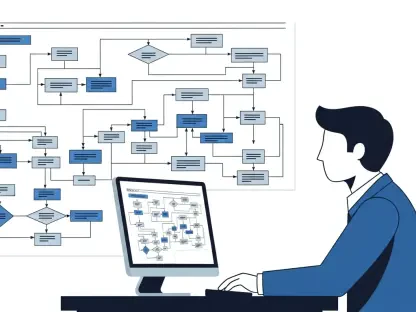Artificial Intelligence (AI) is transforming how businesses analyze customer behavior, enabling companies to understand their customers better and faster than ever before. Advances in machine learning have drastically changed the landscape, allowing even non-tech-savvy employees to participate in data analysis. AI-powered tools automate tasks that traditionally required extensive manual effort and technical knowledge. These innovations have laid the groundwork for a new era in customer behavior analysis, promising to revolutionize how businesses operate and connect with their customers.
Faster Analysis Through Automation
Reducing Time Required for Data Processing
Without the advantages of AI, analyzing customer data was a grueling process involving multiple manual steps. Data engineers had to spend significant time coding just to standardize varied data formats. Then, teams manually merged duplicate profiles, a process fraught with potential for errors. Analysts took weeks to build statistical models and predict purchasing patterns. Now, AI-driven tools perform these steps within hours, substantially reducing the time required for analysis. A task that took three data engineers at a U.K. retailer two weeks to complete can now be finished in under an hour, illustrating the dramatic time savings that AI can offer.
Automation Reduces Human Error
Beyond just speeding up processes, AI has also greatly reduced human error, another significant factor making the analysis more reliable and accurate. When humans manually handle large volumes of data, mistakes are inevitable. Missed duplicates, errors in coding, and flawed statistical models can skew results, rendering the analysis less effective. AI tools, on the other hand, execute these tasks with precision, ensuring higher data integrity. The automation of redundant tasks allows data scientists to focus on more complex analyses that add value to the business. This enhanced accuracy is critical in business decisions where precision in interpreting customer behavior can lead to significant competitive advantages.
Simplified Data Access
Empowering Marketing Teams
Traditionally, marketing teams had to rely heavily on their technical counterparts to extract valuable customer insights from raw data. This involved formal requests and waiting for data engineers to write and test SQL queries, a time-consuming process. AI tools have revolutionized this by enabling marketing managers to obtain insights within minutes. By merely typing queries into AI tools, they can access critical data swiftly and efficiently. This real-time access empowers marketing teams to make timely decisions, improving their ability to adapt to market changes and customer needs almost instantaneously.
Enhancing Decision-Making
The ability to swiftly garner customer insights significantly impacts the timeliness and relevance of marketing strategies. With AI tools at their disposal, marketing managers can make more informed decisions by precisely analyzing current trends and customer preferences. This access not only speeds up the decision-making process but also enhances the quality of decisions being made. Marketing campaigns can become more targeted and effective, leading to better customer engagement and increased sales. The democratization of data access through AI effectively transitions marketing departments from reactive roles to proactive agents of the business.
Personalized Customer Communications
Moving Beyond Broad Campaigns
AI enables businesses to move away from broad, generic marketing campaigns to highly personalized communications. Such specific targeting was almost impossible before AI. Retailers, for example, can now create personalized offers, shifting from a blanket “20% off all winter wear” campaign to targeted messages like “Ms. Smith, the wool coat you viewed last week is now available in your size and preferred color.” By addressing individual customer preferences, businesses can significantly improve customer satisfaction and retention. Personalized messages resonate more with customers, fostering a deeper connection and greater loyalty to the brand.
Benefits to Customer Experience
The potential for personalized communication ushers in a new era of customer experience. Tailored promotions and messages make customers feel valued and understood, increasing their likelihood to engage with the brand. Furthermore, AI can analyze past behavior and predict future needs, ensuring that customers receive offers and recommendations that are relevant to them. This personal touch can transform the customer journey, making it more enjoyable and satisfactory. Businesses not only benefit from increased sales but also from the enhanced reputation that comes from satisfying their customers’ unique needs effectively.
Enhancing Business Capabilities
Importance of Data Quality
For successful implementation of AI in customer behavior analysis, maintaining high data quality is paramount. Poor data quality can compromise the effectiveness of AI algorithms, leading to misguided insights and decisions. Businesses should invest in robust data management systems and continuously monitor data quality. Properly structured and clean data allows AI tools to yield more accurate and actionable insights. Furthermore, educating and training staff on the importance of maintaining data quality ensures that the entire organization is aligned with the goal of leveraging AI effectively.
Staff Training and Adaptation
Artificial Intelligence (AI) is revolutionizing the way businesses analyze customer behavior, allowing companies to gain insights more efficiently and comprehensively than ever before. With significant advancements in machine learning, the landscape has been dramatically reshaped. These advancements have empowered even non-technical employees to engage in data analysis, democratizing the process. AI-powered tools automate tasks that previously demanded a considerable amount of manual effort and specialized technical knowledge. This automation not only saves time and resources but also increases accuracy and reliability in data analysis.
Moreover, AI’s capabilities extend far beyond mere data crunching. It can predict customer preferences, identify emerging trends, and personalize marketing strategies, enhancing customer engagement and satisfaction. These innovations are the foundation of a new era in customer behavior analysis, promising to transform business operations and customer interactions. As AI continues to evolve, businesses that leverage these tools will be well-positioned to lead in their respective markets, fostering stronger connections and delivering better customer experiences.









